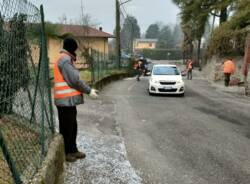
Ethics and innovation: the values of Italian scientific research
Professors Simoni and Bolis take stock of the situation of research: “We Italians are in the forefront and, for this reason, we are bringing techniques, not just ideas, to America”
 “Yesterday we saw the reconstruction of a trachea thanks to the amniotic stem cells. We are still at the animal testing stage, but will soon start testing on humans. It will take just a few years.” At the inauguration of the Boston Biocell Centre, Professor Giuseppe Simoni was very enthusiastic. Coming to teach here, in the cradle of innovation, is a deserved achievement for him. Indeed, Simoni has worked on the stem cells extracted from amniotic fluid, for 30 years, developing an even safer, more reliable technique. While research focused on embryonic stem cells, his centre was developing an alternative, which could now turn out to be better.
“Yesterday we saw the reconstruction of a trachea thanks to the amniotic stem cells. We are still at the animal testing stage, but will soon start testing on humans. It will take just a few years.” At the inauguration of the Boston Biocell Centre, Professor Giuseppe Simoni was very enthusiastic. Coming to teach here, in the cradle of innovation, is a deserved achievement for him. Indeed, Simoni has worked on the stem cells extracted from amniotic fluid, for 30 years, developing an even safer, more reliable technique. While research focused on embryonic stem cells, his centre was developing an alternative, which could now turn out to be better.According to Prof. Pierfrancesco Bolis, lecturer at the University of Insubria, and head physician at the “Circolo” Hospital, “The internationalisation of Biocell is going in the right direction. For the first time in history, an Italian group is bringing a technique here, not just an idea. This has also amazed the Governor, Patrick Deval.”
But why are amniotic stem cells so important? “Amniotic stem cells are the best we have discovered so far.” Bolis explains. “Up to now, we have been giving either no, or incorrect information, in Italy. Whenever we talk about genetics, people tend to withdraw. It’s rather like talking about sex during the Victorian age. We should say at once that working on the amniotic stem cells presents no ethical problems. Taking these cells presents no risk for the foetus or for the mother. We can’t ask a woman to undergo amniocentesis only to remove cells, but I think it’s perfectly ethical to inform her of this possibility, when she has already decided to undergo this test.”
So, in highlighting the ethical aspect, there is a distinct element of the Biocell Centre policy: “The preservation of these cells entails no questions of ethics,” Bolis explains, “because there are no other implications, as there are in the case of embryonic cells.”
However, at the moment, only a few women know about the opportunities provided by preserving the amniotic stem cells. “They don’t know about this, but I think it would be appropriate to suggest cell preservation.” explains the expert. “At the moment, this is the best opportunity because, after the amniocentesis test, we need only a few cubic centimetres of fluid, with no other problems. We should consider that we developed a technique when it was still thought that the embryonic cells were the best available, which, as we know, created all sorts of problems, also of an ethical nature.”
The promises of this sector appear hopeful: although they are still experimental, there are many therapies based on this resource and, in the future, they could improve so many lives. Not just in Italy, but throughout the world.

TAG ARTICOLO
La community di VareseNews
Loro ne fanno già parte
Ultimi commenti
mike su La neve in montagna continua a sciogliersi. Contro la siccità si aspetta la pioggia
Felice su La festa "techno" nei boschi di Lonate Ceppino causa proteste
Rolo su Pullman in sosta con i motori accesi, la segnalazione e la risposta di Autolinee Varesine
lenny54 su "C'è del dolo nelle modifiche al Superbonus"
Felice su Architetti, geometri, ingegneri e costruttori all'unisono: "Da Super Bonus a Super Malus"
Felice su Dentro la loggia del Battistero di San Giovanni a Varese restituita alla città













Accedi o registrati per commentare questo articolo.
L'email è richiesta ma non verrà mostrata ai visitatori. Il contenuto di questo commento esprime il pensiero dell'autore e non rappresenta la linea editoriale di VareseNews.it, che rimane autonoma e indipendente. I messaggi inclusi nei commenti non sono testi giornalistici, ma post inviati dai singoli lettori che possono essere automaticamente pubblicati senza filtro preventivo. I commenti che includano uno o più link a siti esterni verranno rimossi in automatico dal sistema.